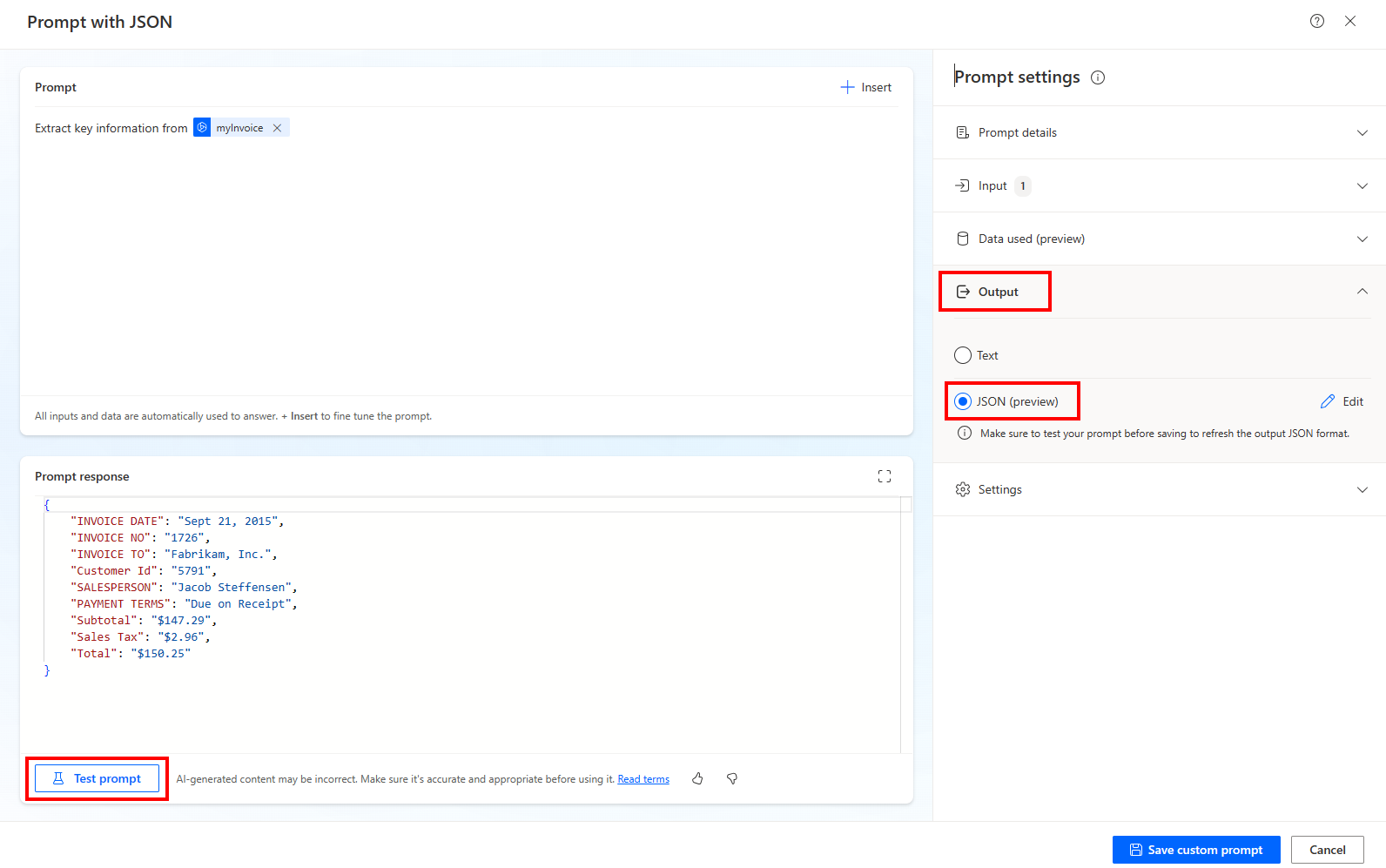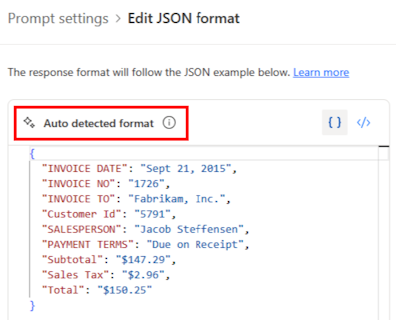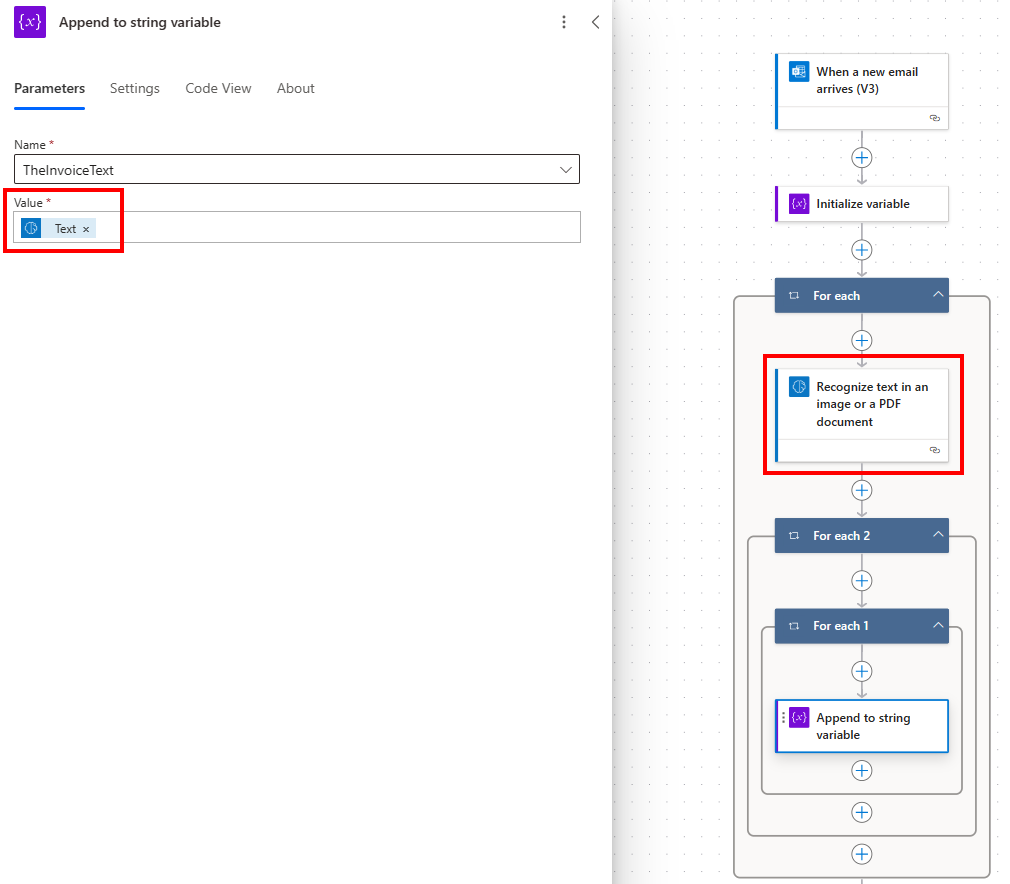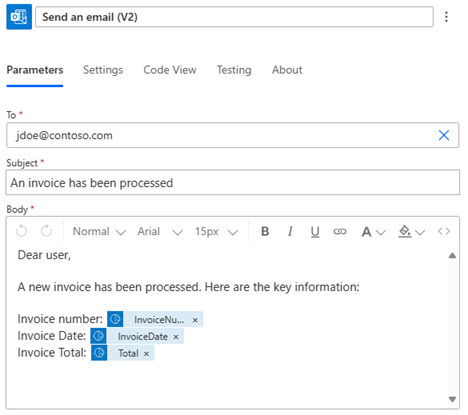Change the output of your prompt
By default, the prompt generates text as response. Text can be convenient for many uses cases. However, if the response has several elements that need to be identified individually, the text option can be limited.
Benefits of using JSON output
The JSON output allows you to generate a JSON structure for your prompt response instead of a text. JSON allows an easier processing of responses with multiple elements in Power Automate or Power Apps.
Following is an example of use cases that become possible with JSON output:
- Display structured content like project schedule or product information.
- Extract data from text like invoices, purchase order, delivery forms, and many more.
- Identify object attributes from text sources like emails or Dataverse data.
- Get multiple categories or sentiments from a text.
Create a prompt with JSON output
This section describes how to select JSON as output and edit the JSON format.
Select JSON as output
To change how the prompt response is rendered, follow these steps:
On the panel to the right under the Prompt settings heading, select Output > JSON.
On the bottom left, select Test prompt to check how your prompt response renders in JSON.

Edit JSON format
By default, the format is Auto detected. This format means each time you test your prompt, the format associated to the prompt is refreshed with the one detected at testing time. This format is convenient when you're iterating on your prompt instructions and want to know how the response format evolves.

If you update the JSON example, the format becomes Custom and is never updated if you test your prompt again. This format is convenient when you don't want prompt tweaking to influence the format, or if you need to follow a specific format.
You can revert to auto detect mode by selecting Back to auto-detect.

To test and save your prompt, follow these steps:
To confirm the newly modified example, select Apply.
To check how your prompt response renders with the new format, select Test prompt.
When you finish your modifications, select Save custom prompt.
If you skip this step, your changes are lost.

When you save your prompt, you're locking the latest Auto-detected format or the Custom format defined. This means when you use your prompt in Power Automate or Power Apps, the saved format is used—it doesn't vary.
At any time, you can check the JSON schema that generates out of the JSON examples by selecting </>. You can't modify this schema currently.
Use a prompt with JSON output in Power Automate
After you add the Created text with GPT action in a Power Automate flow, you can use all the JSON fields as dynamic values without adding complex logic to parse the response.
The following example shows how you can process an invoice received by email using the prompt described in Create a prompt with JSON output in this article.
Create a flow with the trigger, When a new email arrives.
To learn more, go to Get started with triggers.
If you just need to process specific emails, make sure to set filters.
Extract the text of the attachments with the action, Recognize text in an image or a PDF document.
To learn more about how to create and modify a flow in the designer, go to Understand the cloud flows designer.
As the previous action returns a table of lines within a table of the page, it's more convenient to aggregate all the lines in a unique variable.
Initialize a variable and append the Text dynamic value from the Recognize text in an image or a PDF document action in this variable.

Complete the flow by doing the following steps:
- In your flow, select Create text with GPT using a prompt.
- On the Parameters tab in the Prompt field, select prompt with JSON as the output.
- Add the invoice variable you created in the prompt input.
The following procedure allows you to easily and safely use multiple values extracted from a text using a prompt.
In your flow, select Send an email.
On the Parameters tab, send an email that contains the elements extracted by the prompt with JSON output.

FAQ
A JSON couldn't be generated
You might encounter the following error while testing a prompt: A JSON could not be generated. Edit your prompt instruction and try again.
This error might be because the model is enclosing the JSON output with metadata information that prevents successful verification of the required JSON format. To resolve the issue, try adding the following instruction to your prompt: Don't include JSON markdown in your answer.
No JSON is returned in auto-detect mode
It's possible that no JSON is returned after selecting Test prompt with the auto-detect mode activated. It might be because the prompt instructions contradict with the system instruction of returning a JSON. It could be solved by changing the prompt instruction and test again.
JSON format isn't updated at prompt runtime
The latest JSON format detected in auto-detect mode or the latest JSON format defined in custom mode is recorded at prompt save time. This recorded JSON format is applied at prompt runtime, ensuring the consistency of the response format even when dynamic inputs to the prompt are changing.
Limitations
- You can't modify a JSON schema.
- We don't support defining a JSON format without field keys.
Example:["abc", "def"]isn't supported but[{"Field1": "abc"}, {"Field1": "def"}]is supported.